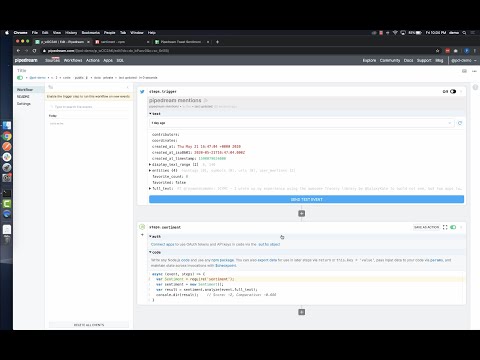What do you want to automate
with Google Sheets and Algolia?
Prompt, edit and deploy AI agents that connect to Google Sheets, Algolia and 3,000+ other apps in seconds.
Trusted by 1,000,000+ developers from startups to Fortune 500 companies
Popular Ways to Connect Google Sheets with Algolia#
Popular Google Sheets and Algolia Triggers#
Emit new event each time a comment is added to a spreadsheet.
Emit new event each time a row or rows are added to the bottom of a spreadsheet.
Emit new event each time a row or rows are added to the bottom of a spreadsheet.
Emit new event each time a row or cell is updated in a spreadsheet.
Popular Google Sheets and Algolia Actions#
Add a single row of data to Google Sheets. See the documentation
Add multiple rows of data to a Google Sheet. See the documentation
Adds an array of JavaScript objects to the given index. See docs here
Get all values or values from a range of cells using A1 notation. See the documentation
Overview of Google Sheets#
The Google Sheets API allows for the creation, reading, updating, and deletion of data within Google Sheets, enabling a robust platform for spreadsheet management and data manipulation. Through Pipedream, you can craft serverless workflows that respond to various triggers, such as webhook events, emails, or scheduled times, to interact with Google Sheets. This synergy can automate reporting, synchronize data across applications, manage inventory, track leads in a CRM, or even conduct survey analysis by updating and retrieving sheet data on the fly.
Connect Google Sheets#
import { axios } from "@pipedream/platform"
export default defineComponent({
props: {
google_sheets: {
type: "app",
app: "google_sheets",
}
},
async run({steps, $}) {
return await axios($, {
url: `https://www.googleapis.com/oauth2/v1/userinfo`,
headers: {
Authorization: `Bearer ${this.google_sheets.$auth.oauth_access_token}`,
},
})
},
})
Overview of Algolia#
Algolia is a powerful search-as-a-service platform that makes it easy to deliver fast, relevant search experiences to users. The Algolia API allows developers to programmatically manage search indices, perform searches, and capture insights about search activity. With Pipedream, you can harness this API to automate and integrate Algolia's capabilities with other apps, creating efficient workflows that enhance search functionalities and user engagement. You can sync data across platforms, automate content indexing, and trigger actions based on search patterns or user behaviors.
Connect Algolia#
import { algoliasearch } from 'algoliasearch';
export default defineComponent({
props: {
algolia: {
type: "app",
app: "algolia",
}
},
async run({steps, $}) {
const client = algoliasearch(this.algolia.$auth.application_id, this.algolia.$auth.api_key);
return await client.listIndices()
},
})
Related Videos#



Community Posts#


